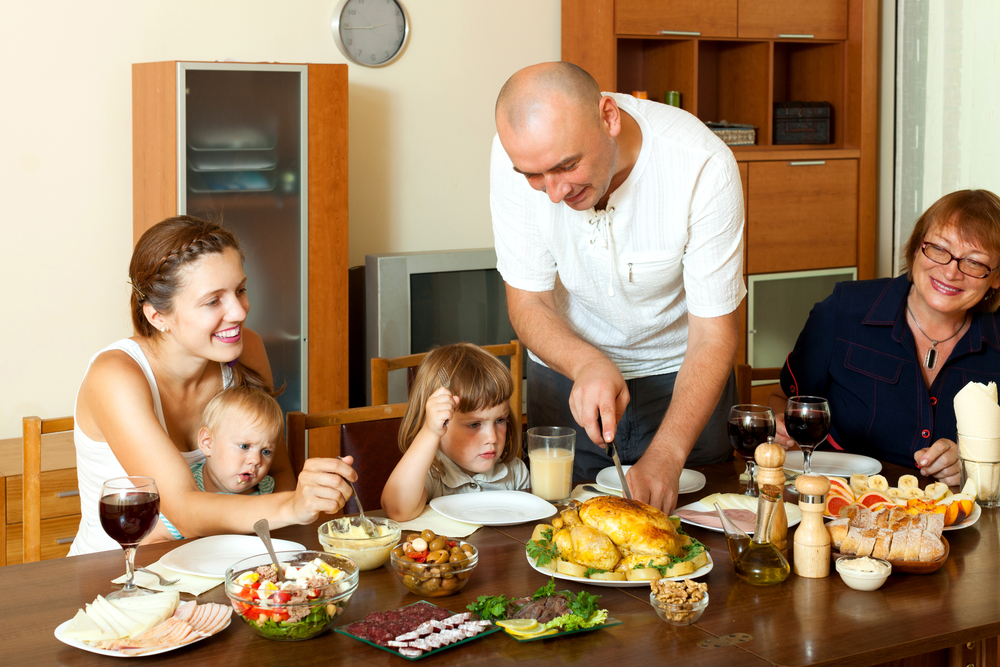


Meals together are more meaningful than ever in the age of devices and diverse family types, according to a psychiatrist, who said it is worth maintaining some semblance of sharing meals together in a household, even if it’s just two to three times a week.
In terms of quality time with your children, it’s just so precious, with statistics showing that by the time children are 18, 90 percent of their time with their parents has passed.
Meal times provide a consistent opportunity for families to nurture strong bonds, as members share and discuss the challenges of the day or bond over new memories.
This is why family dinners correlate with all sorts of health markers, varying from obesity to better mental health, Australia-based psychiatrist Tanveer Ahmed says.
“Regular family dinners are still a great marker of a stable, cohesive household, and that is very beneficial for kids,” he told The Epoch Times.
Mealtimes not only give children a chance to talk with their parents and grandparents about things that bother them but also open their minds to a wider range of concepts, words, and stories.
“It challenges them and pushes them because, while they have teachers at school, most of their interaction is with their peer group. So it’s very important that they get a broader range of intergenerational contact,” he said.
“They hear abstract concepts and a wider range of vocabulary when talking to their parents, which can challenge them. There’s evidence suggesting that this does improve the kid’s language around abstract concepts and problem-solving.”
For grandparents, regular dinners with the family are a great antidote for social isolation, which research has shown affects one in three elderly people today.
Being unable to drive, the elderly are more often challenged with health and mobility issues, physical changes, and cognitive decline that are major hurdles to being social.
For some older adults, that family dinner may be their only interaction for days or weeks.
At a time of increasingly diverse family compositions and family practices, academics from Australia’s Monash University have suggested that promotion of the “family meal imperative” sets unrealistic expectations.
Sociology professor Jo Lindsay said that sitting down together every night is “rooted in an anachronistic and conspicuously old-fashioned notion of the family” and that it “only serves to increase parenting guilt,” in her research published in the journal Critical Public Health.
However, even non-traditional nuclear families would benefit greatly from incorporating sit-down meals together as often as possible, Ahmed said.
He acknowledged that modern life may not allow for it in the same way that it did in the past, including not only a greater variety of family structures, but also busy teenagers and children, and a range of working arrangements including shift work, and meetings from home.
“So there’s a lot of complexity here now, and it’s certainly not as simplistic as a 1950s-type family arrangement,” he said. “But that shouldn’t be a reason to feel guilty or give up trying.”
“I think it’s important that we try and enforce rituals,” Ahmed said. “A good example is the Jewish Shabbat tradition of having a Friday night dinner, even if it’s once or twice a week.
“But it can happen in other areas as well. It could be a walk on the weekend, playing board games, or watching a show together.”
Ahmed acknowledged the power that devices have and recommends limiting them to shared interactions.
“The default is often we all retreat to our own rooms and our own screens, and I think you have to work hard to mitigate against that.
“As long as it is something that’s connecting you together, rather than casually looking at TikTok on your own, it can still bring people together,” he said.
“If you have something that is shared, or it might be something you’ve shared during the day, and then you’re bringing it up and talking about it together, then I think that’s fine.”
Similarly, pediatrician Meg Meeker shared her method of asking everyone put away their phone for an hour when it’s dinnertime.
While this might be a challenge, even for the parents, taking charge of screens at home will teach children that they will be OK without having to be alerted by their phone every minute, and it trains them to decrease their screen time over time.
Ultimately, both the combination of school and family life is about the passing on of knowledge and experiences, and family dinners can be a particularly useful way for connecting, communicating, and having intergenerational interactions.
“Given family dinners are one of the rare places where everyone comes together, it’s a critical part of transmitting ideas and values to the next generation,” Ahmed said.


